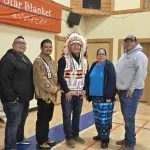
Life in the Big City (part 3)
I am a storyteller. Technically, I am a print journalist – I tell stories of what’s happening around me, make a record of it, and publish it in a newspaper.
I recently read Harold Johnson’s The Power of Story. I learned valuable lessons about how story shapes our entire universe from our creation stories to the way we interpret our inner voice.
The book got me thinking.
What stories do we tell as Indigenous peoples?
Are we defeated victims of colonialism? Or are we champions of our sovereignty who will create and maintain a powerful future for our children?
We can manifest one or the other, but how do we collectively manifest a good future?
In my travels, I’ve met people with different viewpoints and encountered disagreements. But hopefully through storytelling we can begin to learn from one another.
Living in Toronto is sometimes a challenge, but I’m learning a lot from the diversity that exists here.
Not to say what I learned growing up in the rez is bad – what I am saying is we will eventually come across individuals who see the world differently. We can either find the lessons in those differences or find an issue with them. The choice is ours.
Currently, we should take a good look at ourselves and ask if what we are telling ourselves is meaningful, and if the stories we tell are good for our future. In other words, what are we manifesting and telling our children?
As I write this, it dawned on me that I am living my manifestations. I told myself a story one day that I was destined to be a writer because I felt it in my gut.
Today, I write for an actual living, despite the struggles to get here.
Looking back, I never read a book nor did I write an essay until Grade 12. I swear, I thought I was dyslexic.
I could hardly read a sentence without a headache and feeling defeated – but our teacher challenged us.
We were told to not only read all 511 pages of Lawrence Hill’s Book of Negroes, but also write a book report on it.
I recall throwing that book at the wall a few times out of sheer frustration. Things weren’t great at home either, but in order to graduate, I told myself I’d finish it.
Three months later, I completed the task.
I got my book report back almost completely covered in red ink. My teacher, committed to seeing me grow as a writer and student, went over it with me.
Although I got impatient, she didn’t take it personally.
I wish all Indigenous youth could have this same experience – for someone to believe in them and work with them, and for students to have the tenacity to grow, and the will to be challenged.
In Toronto, I find my writing and storytelling is being challenged yet again.
My editor wants to see me grow even further.
Aside from writing, I’ve been thinking about how much of our culture can vanish in just one decade alone.
When I was a kid, if you entered our community hall, you’d see people sitting around tables and speaking Cree to one another.
Today, nobody really does.
As Indigenous storytellers, we have a lot of responsibility to carry. We cannot forget about our sacred languages as we move forward and figure out our destiny.
Johnson’s book really made me think about a lot of things but mostly about where I am, what I am doing and where I’m going.

